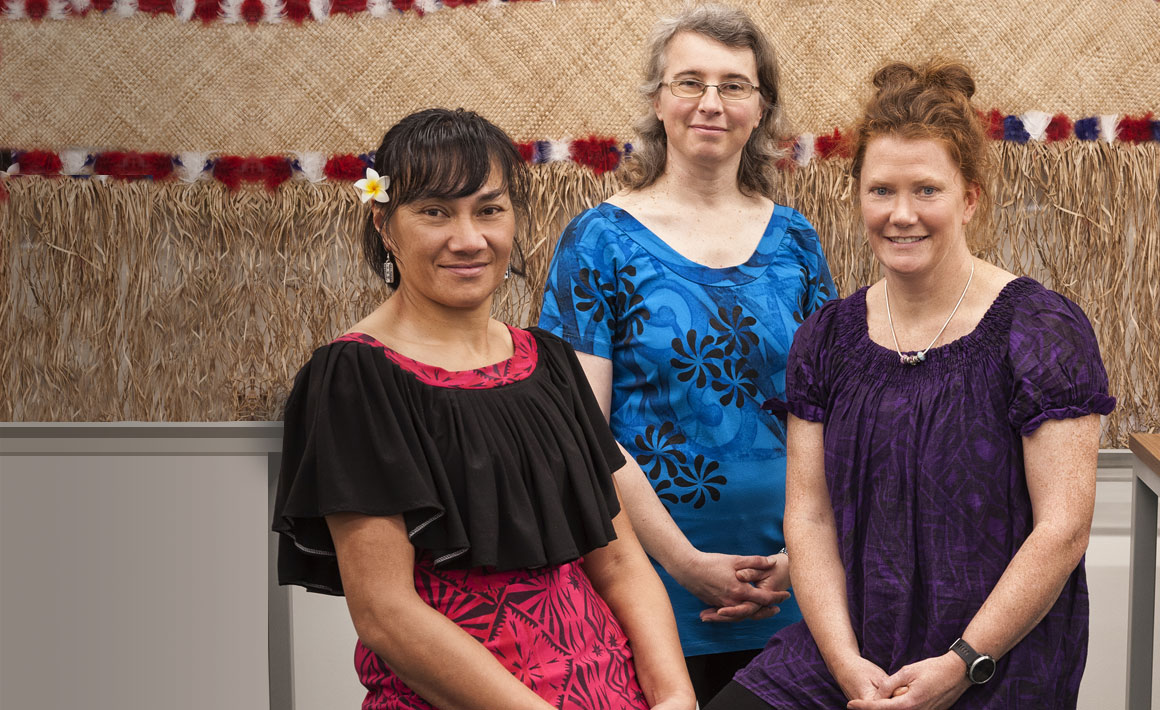 Otago Business School staff Esmay Lemalu-Eteuati, Dr Sarah Carr and Associate Professor Sara Walton.
Otago Business School staff Esmay Lemalu-Eteuati, Dr Sarah Carr and Associate Professor Sara Walton.From a new DBA programme to supporting a social enterprise initiative and supplying much-needed university textbooks, the efforts of several Otago Business School staff are set to make a difference in Samoa.
Sustainable entrepreneurs flourish
There is growing interest in how development agencies in climate-threatened communities can create innovative solutions to meet social, environment and economic needs.
Over the last few years, the Otago Business School has been following Women in Business Development, a non-governmental organisation in Samoa providing products such as coconut oil from organic farms to outlets including the Body Shop.
"This new information will help understand how to build organisational capability to support other social enterprises, with the focus on sustainability."
The initiative empowers and equips rural families to cultivate sustainable businesses, promote fair trade, honour indigenous tradition and use modern technology, strengthen village economies and facilitate global trade.
Otago Emeritus Professor Brendan Gray led a case study in 2014 that described how this business model encourages sustainable entrepreneurship in climate-threatened communities. Key influencers and barriers that affect resilience were identified, which has helped to support research, policy and practice in developing areas.
Since then, the number of Women in Business Development farms has doubled; they have become self-reliant and expanded their product range and volume while maintaining Samoan values, tradition and culture.
But while they are still helping women and families in Samoa, and also now creating livelihoods across the Pacific, the move towards commercialism has not been easy.
Management Associate Professor Sara Walton and two of her Master of Sustainable Business students are working with Women in Business Development Executive Director Adimalaga Tafiana'i to analyse the changing nature of this business model, which has evolved from a development-funded NGO to a more stand-alone social enterprise with an income stream.
"This new information will help understand how to build organisational capability to support other social enterprises, with the focus on sustainability," Walton says.
Walton has taken on an adjunct role with the National University of Samoa (NUS) to work with staff to help develop research capacity.
Otago DBA extended to Samoa
The Otago Doctor of Business Administration (DBA) team is working with the Samoan government to launch a new DBA programme in January 2020.
Otago's DBA programme is already offered through a combination of distance learning and on-campus workshops, in English from the University of Otago, and in Chinese from Shanghai Jiao Tong University, China.
DBA programme manager Dr Sarah Carr says expanding this successful format into the Pacific is a positive move, for the country and for the students. It will give public sector employees in Samoa an opportunity to upskill without leaving their job or families.
It won't be a big programme, but it has a strong focus on issues that are relevant to Samoa, she says. The students' applied research projects will be developed around local needs which are expected to make a difference to sustainability in the country.
Building resources to support teaching
Working with the National University of Samoa (NUS) has made Otago Business School staff appreciate the challenges their Pacific colleagues face in providing education with limited resources – such as having enough textbooks.
Together with Business School PhD candidate and NUS staff member Bernadette Samau, Otago's Business School Associate Dean (Pacific), Esmay Lemalu-Eteuati, rallied around to find spare books to help the NUS Business School.
Otago Business School staff visiting Samoa have already taken four boxes of textbooks in one trip and two boxes in another as part of their luggage. The initiative has now taken off, to the point that the Business School needs other ways of forwarding the growing textbook collection.
"It's a very easy way for us to help the staff and their students and very satisfying; our Samoan counterparts are very grateful for the resource," she says.
